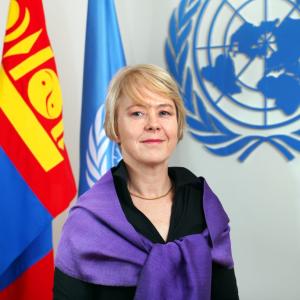Your Excellency Damdin Tsogtbaatar, Minister of Foreign Affairs of Mongolia
Mr Peter Due, Director, Asia and Pacific Division, Department of Political and Peacebuilding Affairs, and Peace Operations
Distinguished Guests and youth leaders,
Welcome to Mongolia, and to the Regional Workshop on Youth, Peace and Security: Perspectives for Dialogues in Northeast Asia.
At 1.8 billion, today’s young generation (10-24-years-old) is the largest the world has ever seen. They are also the majority of Northeast Asia’s population. So ensuring their active role in building sustainable and peaceful societies is a democratic imperative.
Young people are the driving force for achieving the Sustainable Development Goals by 2030 that world leaders committed to: a world free of poverty that can sustain life, leaving no one behind. They represent the most ambitious agenda in human history, and their success depends on the energy, passion and engagement of youth. But there are many challenges to overcome, for youth to play this vital role.
Too often today, rather than being empowered, young people are being left behind – in health, education, jobs, security and politics. So – guaranteeing access to quality education, tackling unemployment, encouraging political and public engagement, as well as supporting healthy lifestyles for young people everywhere, is key to achieving the SDGs.
This is clear from the scale of Mongolia’s youth. 10–29 year-olds account for almost a third of Mongolia’s population and the largest demographic group. They are also highly-educated, with a global outlook and strong language skills.
But their fantastic potential is not as yet being met. Young Mongolians are more likely to be unemployed, affecting over one in five[1] aged 20-24, over twice the national average of 7 percent. They also encounter greater health and security risks, including domestic violence, traffic and work accidents, alcohol abuse, lack of access to social services in remote areas and toxic winter air pollution in cities. Mongolia’s youth also face a lack of family planning services, leading to higher teenage pregnancies. And, as with young people everywhere, they are rarely seen in politics, leaving them largely excluded from decisions determining their future.
Despite these challenges, Mongolia’s youth are driving peace and development, at home and abroad. Take Mongolia’s UN Peacekeepers: for a nation of just three million people, it sends more peacekeepers per capita to safeguard global peace and security than many bigger nations. It has risen to become the 26th largest contributor to UN peacekeeping globally, with 888 military and police personnel active across 5 missions, including young people. We greatly appreciate their important contributions, to a more peaceful, sustainable and inclusive world. I hear you are meeting some young Mongolian peacekeepers tomorrow and am sure this will make for an engaging interaction, to learn more about their roles and aspirations.
From peacekeepers, to entrepreneurs and other role models, Mongolia’s youth prove that young people are agents of change. So, the UN attaches great value to giving young people the skills to live to their fullest, and be heard. Youth are a key group in our programme here, and our agencies are running projects with and for them across the country. UNFPA, WHO and UNICEF, for example, are working to improve access to health and reproductive services for young people in Umnogovi province. They’re also empowering them to take part in public decision-making there, with support from Mongolia’s biggest mining investor, Oyu Tolgoi. While UNDP’s Activated 2030 project aims to make young people more enterprising – encouraging them to be creative, take calculated risks, have drive and determination. This helps them become stronger entrepreneurs and employees, reducing youth unemployment.
I thank the UN's Department of Political and Peacebuilding Affairs for organizing this regional workshop and bringing us all together in Ulaanbaatar. I also thank the Government of Mongolia for hosting this event. This is a opportunity to get to know each other better and begin dialogues that include as many as possible, across countries, and generations. It’s also a chance to exchange experiences and practices in building peace, security, good governance and sustainable development, to realise the SDGs for all.
I hope this can strengthen the relationships between you to create the conditions for collaboration – to work together towards solutions to the complex risks facing this region, including cyber-threats, climate change and other security challenges.
Across the world, young people are stepping up and speaking out for those issues. The global Fridays for Future movement of school-children striking for urgent climate action is a case in point. You are the force on which hope for a better future rests! Your voices must be heard – and we hope platforms like this ensure they are.
In the words of our late former Secretary-General, Kofi Annan, “You are never too young to lead, and you should never doubt your capacity to triumph, where others have not.”
I wish you inspiring discussions and a wonderful stay in Ulaanbaatar! Thank you.










